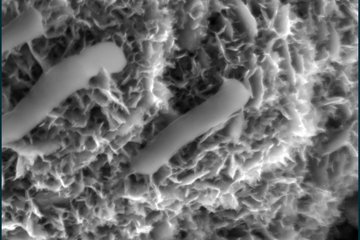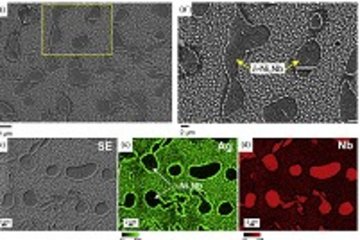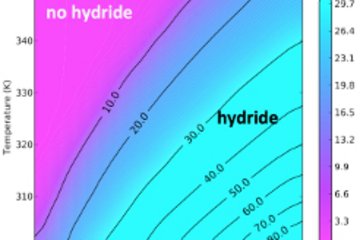All genres
1.
Journal Article
Phase decomposition in nanocrystalline Cr0.8Cu0.2 thin films. Journal of Alloys and Compounds 888, 161391 (2021)
2.
Journal Article
Time-dependent plasticity in silicon microbeams mediated by dislocation nucleation. Proceedings of the National Academy of Sciences of the United States of America 117 (29), pp. 16864 - 16871 (2020)
3.
Journal Article
Electronic structure of metastable bcc Cu–Cr alloy thin films: Comparison of electron energy-loss spectroscopy and first-principles calculations. Ultramicroscopy 178, pp. 96 - 104 (2017)
4.
Journal Article
In–situ TEM study of diffusion kinetics and electron irradiation effects on the Cr phase separation of a nanocrystalline Cu–4 at.% Cr thin film alloy. Journal of Alloys and Compounds 695, pp. 1583 - 1590 (2017)
5.
Journal Article
Stability, phase separation and oxidation of a supersaturated nanocrystalline Cu–33 at.% Cr thin film alloy. Thin Solid Films 623, pp. 48 - 58 (2017)
6.
Journal Article
Maintaining strength in supersaturated copper–chromium thin films annealed at 0.5 of the melting temperature of Cu. Journal of Materials Science 52 (2), pp. 913 - 920 (2017)
7.
Journal Article
Heat-Induced Phase Transformation of Three-Dimensional Nb3O7(OH) Superstructures: Effect of Atmosphere and Electron Beam. Crystal Growth & Design 16 (8), pp. 4309 - 4317 (2016)
8.
Journal Article
Transition from shear to stress-assisted diffusion of copper–chromium nanolayered thin films at elevated temperatures. Acta Materialia 100, pp. 73 - 80 (2015)
9.
Journal Article
Comparing small scale plasticity of copper-chromium nanolayered and alloyed thin films at elevated temperatures. Acta Materialia 93, 12073, pp. 175 - 186 (2015)
10.
Journal Article
Nanostructure and mechanical behavior of metastable Cu–Cr thin films grown by molecular beam epitaxy. Acta Materialia 83, pp. 318 - 332 (2015)
11.
Journal Article
Transmission electron microscopy characterization of CrN films on MgO(001). Thin Solid Films 545, pp. 154 - 160 (2013)
12.
Talk
Atomic scale phase separation tendencies in nanostructured copper alloys. 26th International Symposium on Metastable, Amorphous and Nanostructured Materials 2019 (ISMANAM 2019), Chennai, India (2019)
13.
Talk
Towards ultra-strong alloys: thermal stability and diffusion kinetics of thin films by in-situ TEM. CALPHAD XLVII Conference, International Conference on Computer Coupling of Phase Diagrams and Thermochemistry, Querétaro, Mexico (2018)
14.
Talk
High Temperature Plasticity of Cu–Cr Nanolayered and Chemically Nanostructured Cu–Cr Films. 2017 TMS Annual Meeting & Exhibition, San Diego, CA, USA (2017)
15.
Talk
Chemical demixing and thermal stability of supersaturated nanocrystalline CuCr alloys: Insights from advanced TEM. MS&T '16, Materials Science & Technology 2016 Conference & Exhibition, Salt Lake City, UT, USA (2016)
16.
Talk
In-situ TEM isothermal annealing of nanocrystalline supersaturated Cu–Cr thin film alloys. 80th Annual Conference of the DPG and DPG Spring Meeting, Regensburg, Germany (2016)
17.
Talk
Small Scale Mechanical Testing and its Impact on Materials' Applications. 14th International Union of Materials Research Societies-International Conference on Advanced Materials - Keynote Lecture, Jeju Island, Korea (2015)
18.
Talk
Towards New Insights on Interface Controlled Materials by Advanced Electron Microscopy. Frontiers of Electron Microscopy in Materials Science Meeting (FEMMS 2015), Lake Tahoe, CA, USA (2015)
19.
Talk
Thermo-mechanical behavior of nanolayered thin films. 9th European Solid Mechanics Conference (ESMC 2015), Leganés-Madrid, Spain (2015)
20.
Talk
Nanostructure and mechanical behavior of metastable Cu–Cr thin films grown by molecular beam epitaxy. 61. Metallkunde-Kolloquium - Werkstoffforschung für Wirtschaft und Gesellschaft, Lech am Arlberg, Austria (2015)











